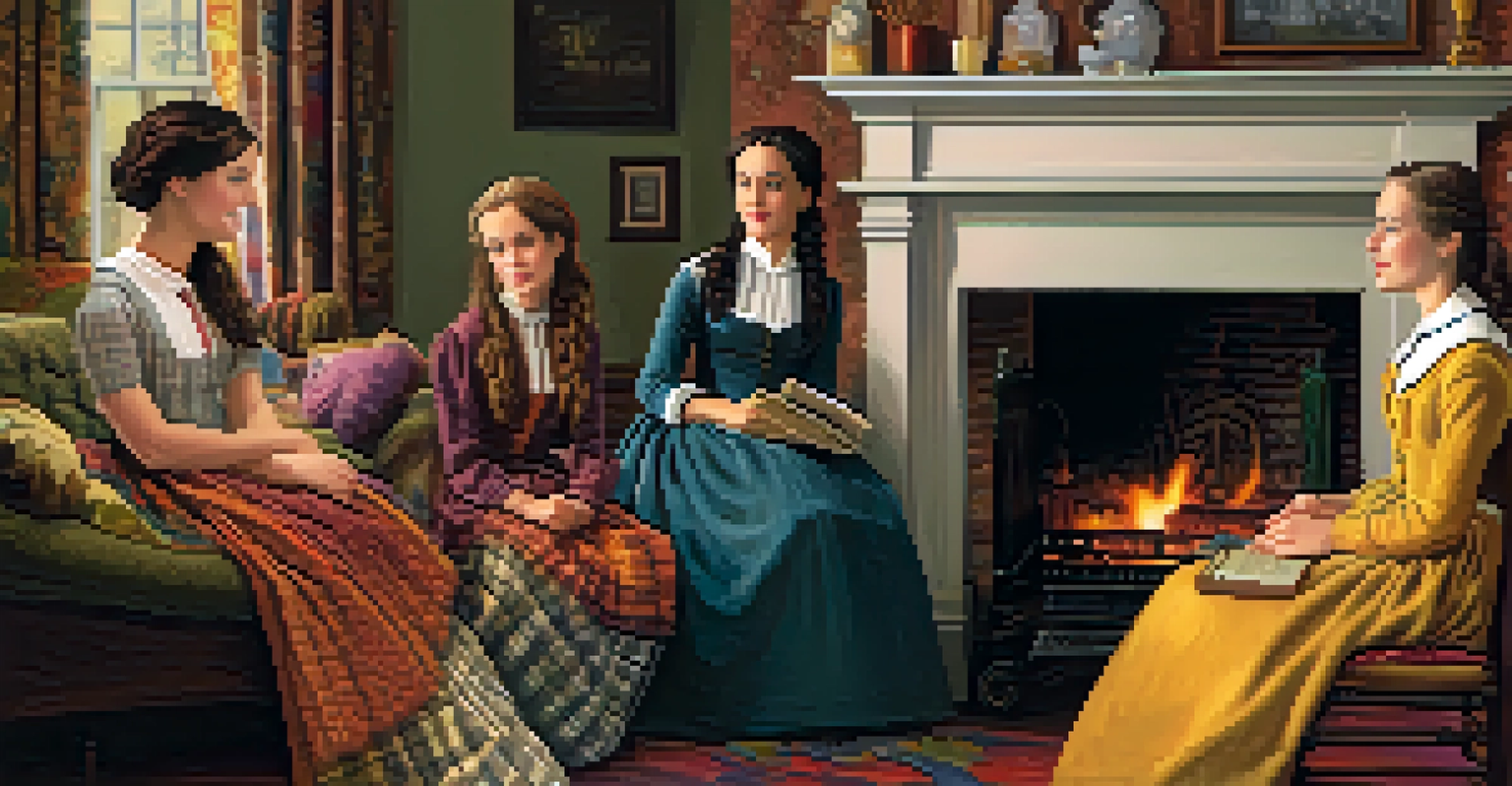Louisa May Alcott: A Bostonian Voice for Women in Literature

Early Life of Louisa May Alcott in Boston
Louisa May Alcott was born in 1832 in Germantown, Pennsylvania, but her family soon moved to Boston. Growing up in a progressive environment, she was influenced by her father, a transcendentalist thinker, and her mother, who was an advocate for women's rights. This early exposure to intellectual discussions shaped her perspective on societal norms and gender roles.
I am not afraid of storms, for I am learning how to sail my ship.
Boston at the time was a hub of literary activity, and Alcott found inspiration in the works of her contemporaries. She began writing at a young age, crafting stories and plays that reflected her keen observations of the world around her. This early passion for writing laid the foundation for her future career as an author.
Alcott's upbringing in a culturally rich city like Boston provided her with opportunities to engage with influential thinkers and writers. These experiences not only nurtured her talent but also instilled in her a desire to challenge the status quo through her writing.
The Struggles of a Female Writer in the 19th Century
In the 19th century, female writers faced significant challenges, including societal expectations to conform to traditional gender roles. Alcott had to navigate a male-dominated literary world, where women were often discouraged from pursuing careers in writing. This struggle fueled her determination to succeed and make her voice heard.

To support her family, Alcott took on various jobs, including writing thrillers under a pseudonym. While these works were commercially successful, they didn't fulfill her artistic aspirations. Alcott's experience highlights the sacrifices many women had to make to carve out a space for themselves in literature.
Alcott's Early Influences Shaped Writing
Growing up in a progressive Boston family, Louisa May Alcott was inspired by her parents' values and the vibrant literary scene around her.
Despite the obstacles, Alcott's resilience shone through. She leveraged her experiences and frustrations into her writing, creating stories that resonated with women and challenged societal norms, ultimately paving the way for future female authors.
The Creation of Little Women and Its Impact
Published in 1868, 'Little Women' became Alcott's most famous work, capturing the lives of the March sisters as they navigated adolescence and womanhood. The novel's relatable characters and themes of independence, family, and personal growth resonated with readers, particularly women. This was revolutionary at a time when literature often depicted women in limited roles.
Women have been called queens for a long time, but the kingdom given them isn't worth ruling.
Alcott infused her own experiences and values into the characters, promoting the idea that women could aspire to more than just marriage and domesticity. This representation empowered women to see themselves as individuals with dreams and ambitions, rather than just wives and mothers. The book's popularity solidified Alcott's place in literary history.
The enduring legacy of 'Little Women' is evident in its numerous adaptations and continued relevance. It has inspired countless readers and writers, proving that Alcott's voice was not just a reflection of her time but a timeless call for women's empowerment.
Louisa May Alcott's Activism Beyond Literature
Alcott was not only a talented writer but also an ardent activist for women's rights and social reform. She was involved in various causes, including abolitionism and women's suffrage, believing that literature could serve as a platform for social change. Her activism was intertwined with her writing, as she often used her stories to address important societal issues.
During the Civil War, Alcott worked as a nurse, an experience that deeply impacted her writing and perspective on life. She wrote about her experiences in 'Hospital Sketches,' which shed light on the struggles faced by soldiers and nurses alike. This work reflected her commitment to social justice and her desire to raise awareness.
Struggles of Female Writers Highlighted
Alcott's journey as a female writer in the 19th century illustrates the challenges women faced in a male-dominated literary world.
Alcott's dual role as a writer and activist exemplifies the power of literature to effect change. She showed that storytelling could be a tool for advocacy, inspiring others to take action and challenge the injustices of their time.
The Feminist Themes in Alcott's Works
Alcott's writings are rich with feminist themes, advocating for women's independence and self-expression. Through characters like Jo March, she challenged traditional gender roles, depicting women who sought to define their own paths rather than conform to societal expectations. This was a bold move at a time when women were often relegated to the domestic sphere.
In 'Little Women' and her other works, Alcott explored the complexities of female friendships, ambitions, and struggles. She emphasized that women could pursue their passions while also navigating familial responsibilities, a concept that resonated with many readers. This nuanced portrayal of women's lives contributed to the evolving conversation around gender equality.
Alcott's ability to weave feminist ideals into her narratives helped lay the groundwork for future generations of writers. Her influence can be seen in the works of contemporary authors who continue to explore themes of female empowerment and identity.
Legacy and Influence of Louisa May Alcott
Louisa May Alcott's impact on literature and society is immeasurable. Her fearless exploration of women's issues in her works opened doors for future female authors, creating a legacy that continues to inspire. Alcott's writings challenged societal norms and encouraged women to embrace their individuality, making her a pioneer in women’s literature.
Today, Alcott is celebrated not only for 'Little Women' but also for her other works that highlight her diverse talents. Her ability to address serious topics with humor and compassion has left a lasting impression on readers of all ages. Schools and literary circles continue to study her contributions, ensuring that her voice remains relevant.
Legacy of Women's Empowerment in Literature
Through her works, especially 'Little Women', Alcott championed women's independence and paved the way for future female authors.
Alcott's legacy is a testament to the power of storytelling as a means of advocacy. Her life and work remind us that literature can shape society, inspire change, and empower individuals to seek their true selves.
Conclusion: Louisa May Alcott's Lasting Impact
In conclusion, Louisa May Alcott was more than just a talented author; she was a trailblazer for women's rights and a voice for those who sought to break free from societal constraints. Her experiences, struggles, and triumphs shaped her writing, making her stories both relatable and revolutionary. Alcott's impact on literature is a reflection of her commitment to empowering women.
Alcott's works continue to resonate with readers today, serving as a reminder of the importance of individuality and the pursuit of one's dreams. Her dedication to addressing the challenges faced by women has inspired countless individuals to advocate for their rights and the rights of others.

Ultimately, Louisa May Alcott's legacy lives on in the hearts of those who read her works and find strength in her words. She remains a symbol of resilience, creativity, and the enduring power of literature to inspire change.